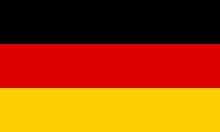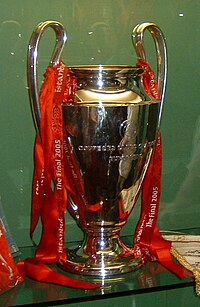Portal:Europe
| Main | Geography | Projects |
[[Image:|300px|Dublin is the capital and largest city of Ireland]]
|
Europe is a continent located entirely in the Northern Hemisphere and mostly in the Eastern Hemisphere. It comprises the westernmost peninsulas of the continental landmass of Eurasia, and is bordered by the Arctic Ocean to the north, the Atlantic Ocean to the west, the Mediterranean Sea to the south, and Asia to the east. Europe is commonly considered to be separated from Asia by the watershed of the Ural Mountains, the Ural River, the Caspian Sea, the Greater Caucasus, the Black Sea, and the waterways of the Turkish Straits. Although much of this border is over land, Europe is generally accorded the status of a full continent because of its great physical size and the weight of history and tradition.
Europe covers about 10,180,000 km2 (3,930,000 sq mi), or 2% of the Earth's surface (6.8% of land area), making it the second smallest continent (using the seven-continent model). Politically, Europe is divided into about fifty sovereign states, of which Russia is the largest and most populous, spanning 39% of the continent and comprising 15% of its population. Europe had a total population of about 741 million (about 11% of the world population), as of 2018. The European climate is largely affected by warm Atlantic currents that temper winters and summers on much of the continent, even at latitudes along which the climate in Asia and North America is severe. Further from the sea, seasonal differences are more noticeable than close to the coast.
The history of Europe concerns itself with the discovery and collection, the study, organization and presentation and the interpretation of past events and affairs of the people of Europe since the beginning of written records. During the Neolithic era and the time of the Indo-European migrations, Europe saw human inflows from east and southeast and subsequent important cultural and material exchange. The period known as classical antiquity began with the emergence of the city-states of ancient Greece. Later, the Roman Empire came to dominate the entire Mediterranean basin. The fall of the Roman Empire in AD 476 traditionally marks the start of the Middle Ages. Beginning in the 14th century a Renaissance of knowledge challenged traditional doctrines in science and theology. Simultaneously, the Protestant Reformation set up Protestant churches primarily in Germany, Scandinavia and England. After 1800, the Industrial Revolution brought prosperity to Britain and Western Europe. The main European powers set up colonies in most of the Americas and Africa, and parts of Asia. In the 20th century, World War I and World War II resulted in massive numbers of deaths. The Cold War dominated European geo-politics from 1947 to 1989. After the fall of the Iron Curtain, the European countries grew together.
The culture of Europe is rooted in the art, architecture, film, different types of music, economic, literature, and philosophy that originated from the continent of Europe. European culture is largely rooted in what is often referred to as its "common cultural heritage".
The economy of Europe comprises more than 744 million people in 50 countries. The formation of the European Union (EU) and in 1999, the introduction of a unified currency, the Euro, brings participating European countries closer through the convenience of a shared currency and has led to a stronger European cash flow. The difference in wealth across Europe can be seen roughly in former Cold War divide, with some countries breaching the divide (Greece, Estonia, Portugal, Slovenia and the Czech Republic). Whilst most European states have a GDP per capita higher than the world's average and are very highly developed (Liechtenstein, Luxembourg, Monaco, Andorra, Norway, Sweden, Denmark, Netherlands, Switzerland, United Kingdom, Ireland, Germany), some European economies, despite their position over the world's average in the Human Development Index, are poorer.
Featured article -
Liverpool Football Club is a professional association football club in Union of European Football Associations (UEFA) competitions. Since 1964, they have won fourteen European and Worldwide trophies, more than any other British club. These consist of the UEFA Champions League (formerly known as the European Cup) six times, the UEFA Europa League (formerly the UEFA Cup) three times, the UEFA Super Cup four times and the FIFA Club World Cup once.
Qualification for European competitions is determined by a team's success in its domestic league and cup competitions from the previous season. Liverpool competed in European competitions for 21 consecutive seasons until the 1985 European Cup final, the occasion of the Heysel Stadium disaster, following which the club was banned from European competitions for six seasons. Since being readmitted in 1991, they have qualified for the UEFA Champions League (the successor to the European Cup) fifteen times, the UEFA Europa League (the successor to the UEFA Cup) twelve times, and the (now-defunct) UEFA Cup Winners' Cup twice. (Full article...)
Featured location -

Germany, officially the Federal Republic of Germany, is a country in Central Europe. It lies between the Baltic and North Sea to the north and the Alps to the south. Its sixteen constituent states have a total population of over 82 million in an area of 357,569 km2 (138,058 sq mi), making it the most populous member state of the European Union. It borders Denmark to the north, Poland and Czechia to the east, Austria and Switzerland to the south, and France, Luxembourg, Belgium, and the Netherlands to the west. The nation's capital and most populous city is Berlin and its main financial centre is Frankfurt; the largest urban area is the Ruhr.
Settlement in what is now Germany began in the Lower Paleolithic, with various tribes inhabiting it from the Neolithic onward, chiefly the Celts. Various Germanic tribes have inhabited the northern parts of modern Germany since classical antiquity. A region named Germania was documented before AD 100. In 962, the Kingdom of Germany formed the bulk of the Holy Roman Empire. During the 16th century, northern German regions became the centre of the Protestant Reformation. Following the Napoleonic Wars and the dissolution of the Holy Roman Empire in 1806, the German Confederation was formed in 1815. (Full article...)
Featured portrait
 |
In the News
- 14 February 2024 – Russian invasion of Ukraine
- Crimea attacks
- Ukraine claims to have sunk the Russian ship Tsezar Kunikov off the coast of Katsiveli, Crimea. A video appears to show the vessel being struck with unmanned surface drones. (Radio Free Europe/Radio Liberty)
- 13 February 2024 – Estonia–Russia relations
- Prime Minister of Estonia, Kaja Kallas, is reportedly placed on the Russian Interior Ministry's register of wanted people due to the country's removal of Soviet War Memorials, making Kallas the first known government leader to be added to a wanted list by Russian authorities. (The Guardian)
- 12 February 2024 – Israel–Hamas war
- Israel–Netherlands relations
- A Dutch appeals court orders a suspension of exports of F-35 jet parts to Israel within the next seven days over concerns that the aircraft parts are being used to commit serious violations of international humanitarian law. Prime Minister Mark Rutte says that the government will appeal the suspension. (Reuters)
- 12 February 2024 – Israel–United Kingdom relations
- British Foreign Secretary David Cameron announces sanctions against four Israeli settlers for engaging in extremist violence towards Palestinians in the occupied-West Bank. (Al Jazeera)
Updated: 16:33, 14 February 2024
Categories
Featured biography -
Johannes Kepler (/ˈkɛplər/; German: [joˈhanəs ˈkɛplɐ, -nɛs -] ; 27 December 1571 – 15 November 1630) was a German astronomer, mathematician, astrologer, natural philosopher and writer on music. He is a key figure in the 17th-century Scientific Revolution, best known for his laws of planetary motion, and his books Astronomia nova, Harmonice Mundi, and Epitome Astronomiae Copernicanae, influencing among others Isaac Newton, providing one of the foundations for his theory of universal gravitation. The variety and impact of his work made Kepler one of the founders and fathers of modern astronomy, the scientific method, natural and modern science. He has been described as the "father of science fiction" for his novel Somnium.
Kepler was a mathematics teacher at a seminary school in Graz, where he became an associate of Prince Hans Ulrich von Eggenberg. Later he became an assistant to the astronomer Tycho Brahe in Prague, and eventually the imperial mathematician to Emperor Rudolf II and his two successors Matthias and Ferdinand II. He also taught mathematics in Linz, and was an adviser to General Wallenstein. Additionally, he did fundamental work in the field of optics, being named the father of modern optics, in particular for his Astronomiae pars optica. He also invented an improved version of the refracting telescope, the Keplerian telescope, which became the foundation of the modern refracting telescope, while also improving on the telescope design by Galileo Galilei, who mentioned Kepler's discoveries in his work. (Full article...)
Featured picture
 |
Related portals
Major Religions in Europe
Northern Europe
Western Europe
Central Europe
Eastern Europe, Balkans and Caucasus
Southern Europe
Featured panorama
 |
Topics
Associated Wikimedia
The following Wikimedia Foundation sister projects provide more on this subject:
-
Commons
Free media repository -
Wikibooks
Free textbooks and manuals -
Wikidata
Free knowledge base -
Wikinews
Free-content news -
Wikiquote
Collection of quotations -
Wikisource
Free-content library -
Wikispecies
Directory of species -
Wikiversity
Free learning tools -
Wikivoyage
Free travel guide -
Wiktionary
Dictionary and thesaurus

























